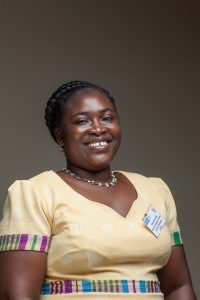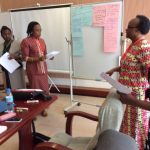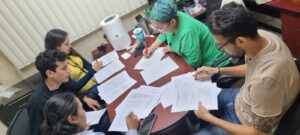
Spotlight: Evidence for gender policy at regional level in Ghana
 An interview with Thywill Eyra Kpe, Regional Director for the Department of Gender (Central Region) in Ghana
An interview with Thywill Eyra Kpe, Regional Director for the Department of Gender (Central Region) in Ghana
In April 2015, Thywill Eyra Kpe participated in the first VakaYiko evidence-informed policy making course to be run by Ghana’s Civil Service Training Centre. At that time, she was posted in the Volta Region of the country but she has since moved to the Central Region as the Regional Director for the Department of Gender, under the Ministry of Gender, Children and Social Protection. In this interview, she discusses gender, evidence and regional policy in Ghana.
What do you do as Regional Director for the Department of Gender?
I coordinate and promote gender equality in the region by engaging stakeholders, advocating with other MDAs (ministries, departments and agencies), and also dealing with women’s groups and men’s groups in communities. I collect information, which I pass on to my head office […] when there is the need for policy information in a specific area; this information feeds into that policy demand.
As a Regional Director you also identify challenges in your region and address them locally. Once you address them, you can also feed the head office with results of what you are doing.
When I came to the region last year, there were no staff—that was a basic challenge. I use national service personnel, and some people are coming to volunteer with my department as well.
For the purpose of mainstreaming, we have gender desk officers at the various district assemblies who are supposed to ensure that gender is mainstreamed into the development process. I liaise with them and provide them with technical backstopping. For example, I have asked them to come up with gender profiles for their district and collate the women’s groups and gender groups in their district.
What kinds of evidence do you use?
It depends on the kind of activity we are doing. Sometimes we use evidence from development partners, sometimes we rely on grey evidence from other MDAs as well as our own ministry. I also work with data from the Domestic Violence and Victim Support Unit (DoVVSU).
Sometimes we use evidence from stakeholder engagement—we engage communities a lot.
When you are looking for local content, it is difficult. Sometimes you need to fall on the raw data from the MDAs to be able to do your work because that is the only thing you can get. Some of them still produce evidence without properly disaggregating it.
The Ministry does the CEDAW report and the MDG report but they don’t publish all of them. Sometimes they produce a small booklet. For instance, the CEDAW report last year, they gave me one and in the movement [to the new job in Central Region] I lost it, and I can’t get it again as it’s not online. Going forward, maybe the ministries can begin to create online resources.
What kinds of relationships do you have with research institutions?
I work with UCC – Centre for Gender Research Advocacy and Development. They are mostly focused on gender issues so I link with them as and when they have information.
These days it’s difficult, you call and call and call and nobody seems to have any research on some of these gender issues. For example, I call our DoVVSU secretariat and ask for any research on sexual and gender-based violence (GBV) in schools. Some of my partners from the university were trying to do something concerning that and they came to my office but I didn’t have any information on it, so I called Accra to see if there was any research work on violence in schools that we could refer to. There may also be research out there on these issues which is not published.
We don’t have any national research on GBV in Ghana. If you ask for something on GBV in Ghana they will give you something from 1998, which for me is too old; information should respond to the current needs. There are new trends of violence that are coming up, what are we doing to identify those? It’s time we do specific, in-depth research into some of these gender issues and appropriately publish them.
How do you see evidence contributing to gender policy making in Ghana?
I think it is very necessary because the social sector is gaining recognition and we need the knowledge to be able to do the right things. For social policies, it starts right from consultation with stakeholders, then it goes to the regional level and that feeds into the broad policy. It’s very necessary that we also have background in what information we collect, how we present it to make an impact and feed properly into whatever policy the central government is thinking of making.
A different version of this interview, focusing more on Thywill’s experience with VakaYiko training, featured in the VakaYiko Lessons Learned report.
Since this interview was conducted, Ghana’s Ministry of Gender, Children and Social Protection has published new research on sexual and gender-based violence. Other national documents now available online include the national gender policy and the 2015 Millennium Development Goals Report. Challenges remain however in generating quality local content evidence for gender policy at the regional level.

 Previous Post
Previous Post



Thanks INASP for sharing. Thankfully our ministry has published a current research on SGBV in Ghana. That was after this interview. A couple of publications are also available now online like the new National Gender Policy, Ghana’s 2015 MDG report among others.